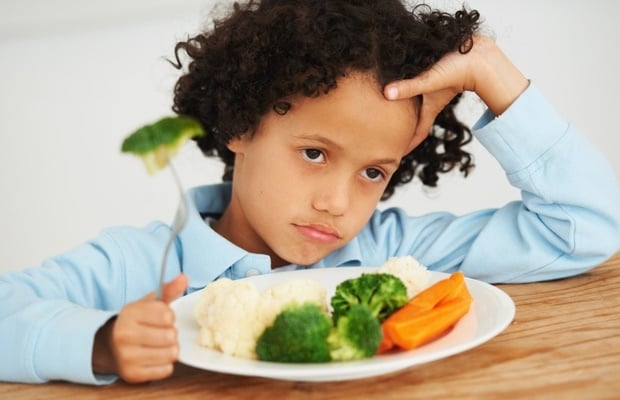
If you have a toddler, a few tantrums are guaranteed – including the inevitable supermarket meltdown. The irony is that the food in the aisles of the grocery store he’s having that meltdown in – vegetables, red meat, porridge oats – can actually improve your child’s behaviour.
“As adults, we know it’s important to eat regularly to maintain concentration and mood, but this is just as important for children,” says Amanda Ursell, author of Baby And Toddler Food Bible. If you’re clued up on which foods have a positive effect on your child, it will be easier to keep him relaxed and focused.
So, as well as ensuring your tot is fed regularly, add these to the menu for a happier little one.
It’s Breakfast Time
Eat… Oats
Start the day off with the right meal and half your battle is won. Try serving oats with milk, and sprinkle some sunflower seeds over it. Not your usual combination, this bowl of healthy ingredients helps to stabilise your tot’s mood from the beginning.
“Serotonin is known as the happy hormone, and it helps nerves communicate with one another.
"It is also strongly linked to mood, sleep patterns and circadian rhythms, cognition, appetite, neuro-development and hormone development. Tryptophan, an amino acid found in food, is essential for serotonin production."
It is especially important to take in the correct amount of tryptophan compared to other amino acids,” says Nutripaeds paediatric dietician Amanda Rusch.
Read: Do your kids eat breakfast?
“The most potent way to increase tryptophan, and therefore serotonin, in the brain is via alpha-lactalbumin, which can be found in whey in products such as milk, yoghurt and soft cheeses like cottage or ricotta cheese.
Ensuring an adequate intake of carbohydrates is another important way to help little brains manufacture serotonin from tryptophan – stick to slow release carbs such as oats, brown rice and wholewheat bread.”
“Oats have a low to intermediate GI. This means that the type of carbohydrate that oats contain has a favourable effect on blood sugar levels, keeping them constant and preventing any peaks and troughs.
Low blood glucose levels can lead to symptoms of hunger, tiredness and feeling faint and if these are ignored it can then lead to your child feeling irritable and moody (which could ultimately result in a tantrum),” adds dietician Laura Berry.
Drink… milk or water
Hydration throughout the day is key for all these reactions between foods and mood to work better. Juice and fizzy drinks are not the way to go as they affect blood sugar levels, so it’s best to stick to water or milk for your tot. Coconut water (not the milk) is also a good option that is high in calcium.
On the Lunch Menu
Eat… seed loaf sandwich with sliced ham, cottage cheese and cucumber
“Blood sugar spikes that follow a processed carbohydrate meal may appear to lift your little one’s mood and give him happy energy, but soon after the spike there will be a blood sugar crash – resulting in grumpiness, poor concentration, frustration, irritability, fatigue, and even a disturbed night’s sleep.
To ensure a steady release of carbohydrates in the blood, make sure to give a good complex carbohydrate with every meal, such as bran cereal, wholegrain wraps, wholegrain pasta or millet.
Read: How healthy is your child’s lunch?
B vitamins and iron are also essential to help your little one manufacture serotonin – make sure there are enough B vitamin sources (beef, pork, beans, eggs, dark green leafy vegetables, seeds and nuts) and iron sources (meat, fish, dark green leafy vegetables or dried fruit) in your child’s diet every day,” says Amanda.
Eat… mashed sardines on wholewheat toast fingers
It may seem an odd choice for your tot, but oily fish is a great mood booster. “Sardines are rich in Omega-3 oils, which have widespread functions within the body,” says Laura. “Brain tissue is rich in Omega-3 fatty acids, which are important for the maintenance of cell membranes and connections between nerves. The Omega 3 DHA plays a role in the functioning of hormones that affect emotionality.
What’s for Dinner?
Eat… grilled salmon with millet
Fish is a great dinner protein as it’s guaranteed to help your little one settle down to sleep. “Omega-3 fatty acids, found in fatty fish and some nuts and seeds (especially linseed), are already famous for their importance in brain and vision development in children, but new research is showing their importance in managing moods in adults and children, even with disorders such as depression or bipolar disorder,” adds Amanda.
Read: Yummy meals for kids
“Two or more servings of cold water fish a week, such as salmon, mackerel, or sardines, will ensure you and your little one are getting enough of these essential fatty acids. This can sometimes be difficult, especially with fussier kids, so alternatively try mixing linseed oil or flaxseed powder into food, or supplementing with Omega-3 capsules with the largest meal of the day.”
Eat… lamb or ostrich mince
“Lamb and ostrich meats are complete proteins, meaning they provide all the essential amino acids little bodies need. Ostrich is high in iron, and surprisingly iron is one of the most common micronutrient deficiencies in children – this can lead to low energy levels and cognitive functioning. These proteins also provide tryptophan, one of the building blocks of protein.
Besides being an essential component of serotonin production, as explained above, tryptophan is essential because our bodies cannot make it and so we need to obtain it from food,” says Laura.
Eat… steamed spinach
Sneak green leafy vegetables, such as spinach or kale, into your child’s meal and you’ll help him feel happier. Zinc and magnesium play an important part in brain development and vitamin B boosts mood. “Spinach is loaded in nutrients that enhance optimal mood health including folate, and zinc,” says Laura. “Folates play a role in the functioning of the serotonin receptors in the brain,
Read: Baked fish with vegetables
which can therefore have an effect on overall mood. Zinc is a micronutrient that plays a role in the functioning of many enzymes working throughout the body. It is found in the neurotransmitters in the brain and can affect the excitability of nerves and functioning of the nervous system.”
Double-Duty Snacks
Eat… dried apricots and yoghurt
“Yoghurt and apricots have a low GI, which makes them great options for keeping blood glucose levels constant and preventing dips in energy levels that can lead to toddlers becoming irritable. Apricots are also a rich source of vitamins A, C, and E. These are important antioxidants that help to mop up free radicals that cause damage to tissues, and therefore help contribute to optimal overall health,” recommends Laura.
Eat… a handful of lean biltong
A South African favourite, this snack contains loads of iron and vitamin B. “Including protein with each meal will provide the amino acids necessary for neurotransmitter production as well as slow the release of carbs into the blood,” says Amanda.
Read more:
Sneak calcium into your picky eater's diet
Parents affect children’s food habits
Is your child a picky eater? Do they have total meltdowns when its feeding time? send us your comments and stories to chatback@parent24.com we might publish it.




 Publications
Publications
 Partners
Partners














